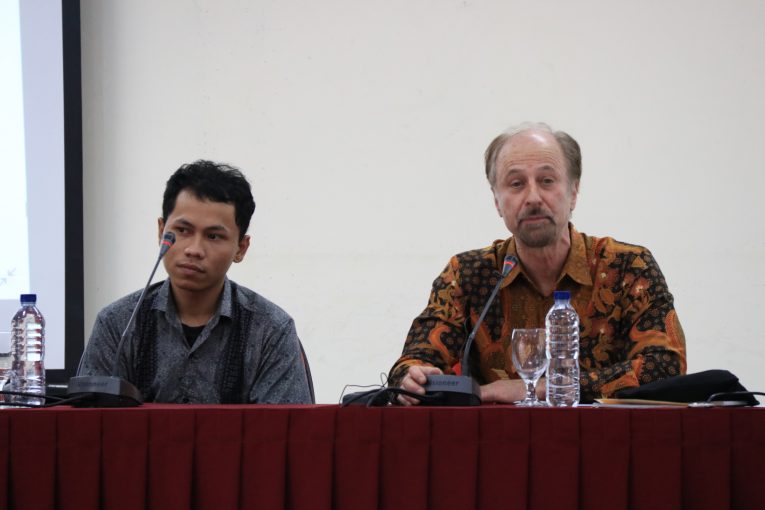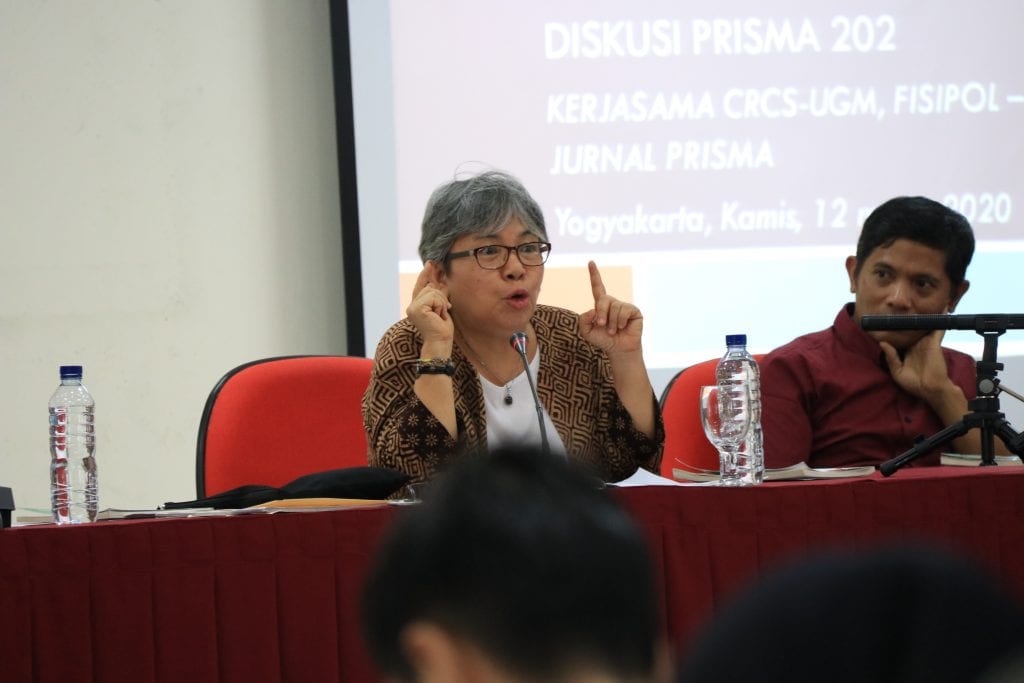
Yogyakarta, March 12th, 2020— Taking place in the East Seminar Room (Ruang Seminar Timur), a discussion and launch of Prisma Journal entitled “Reducing Religion and State Tensions” (“Meredam Ketegangan Agama dan Negara”). The event handled by a collaboration of three parties, specifically: Center for Religious and Cross-cultural Studies (CRCS) UGM Postgraduate, Prisma Journal, and Faculty of Social and Political Sciences UGM. Besides the discussion and the journal launching, there was also a film screening “Beta Mau Jumpa” by Watchdoc Documentary. Panellists of this event include Robert W. Hefner, Boston University; Samsul Maarif, CRCS UGM; Elga Sarapung, Director for Interfaith Dialogue in Indonesia; and Frans Agustinus Jalong, Center for Security and Peace Studies (Pusat Studi Keamanan dan Perdamaian/PSKP) UGM.
The discussion began with the film screening of “Beta Mau Jumpa” which is a collaborative project between Watchdoc Documentary with CRCS UGM. This 33-minutes short film tells the story of peacebuilding of the society after the 1999 riots in Ambon. The horizontal Ambon conflicts occurred between Muslims and Christians, and it had an impact until a few years later. This conflict caused casualties and segregation of residence based on the religion of the community.

Align with the Watchdoc Documentary film, the launch of the Prism Journal 2020 edition “Reducing Religion and State Tensions” also examines religious conflicts occur in Indonesia. Frans Jalong from PSKP UGM stated that Prism Journal in the 2020 edition is quite different from the 2010 edition, although both journals discuss the same topic. Frans compared that studies in 2010 revealed much about the anatomy of violence and organizational movements, in contrast to the 2020 edition which he said was more critical and deconstructive. “More than 40 per cent of the content we read in this edition is more critical and deconstructive, which questioning the arguments built-in 2010,” he said.
In line with Frans, Samsul Maarif also examines the contents of the journal where the first three writings had a common thread on Islamic politics. In the current context, Samsul mentioned that Islamic politics managed in oligarchic contestation which the public neglected to see. Samsul continued that Islamic politics was seen more like a politics of identity so that the conflict created was horizontal conflicts between citizens rather than citizens and elites. “We can see the politics of identity and Islamic politics in the 212 cases a few years ago,” he said.
Nevertheless, Elga Sarapung accentuated that at the moment, the issues of fundamentalism limited on religion such as radicalism, extremism, tolerance, do not only occur in Islam. According to her explanation, it happened in several other religions but Islam is the most prominent one in Indonesia. For Elga, the state has not yet clearly arranged the socio-political and economic dynamics of the community, particularly in responding to religious issues. Elga accentuated that Indonesia needs civil society participation to reduce tensions. She added that we need a more critical and rooted society. “It takes civil society that prioritize democracy, justice, and peaceful enforcement of human rights which peaceful oriented and excluded from a frame of hatred or violence,” Elga added.
Agree with Elga, Robert Hefner stated that issues of religion and belief became a central debate in Indonesia’s citizenship. According to Robert, to create prosperous and fair citizenship we need a synergy in the political-economy to look at religious issues. Besides, Robert added the need to see cultural factors rooted and created from the socio-political structure and contextualized comprehensively in the current era. “Do not let us only see social and political factors talking with some intellectual figures as if their voices are a kind of structural vessel for religious issues,” he said.
